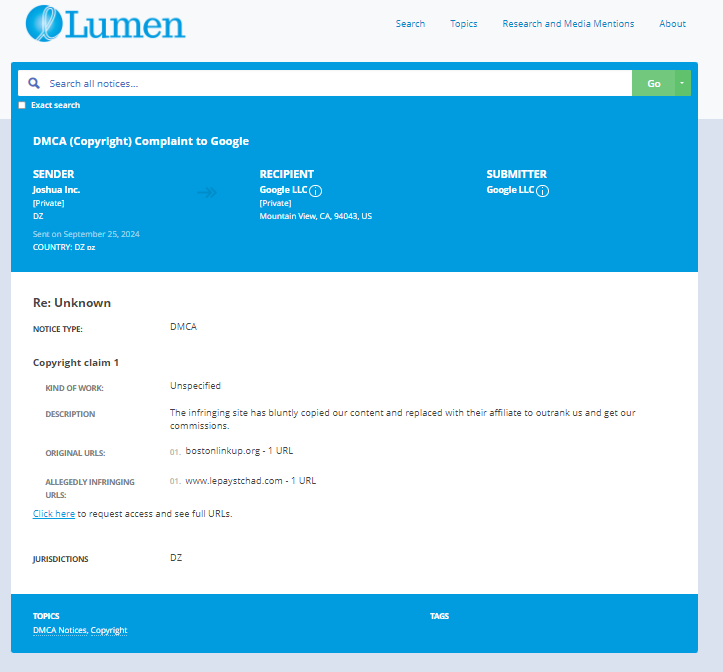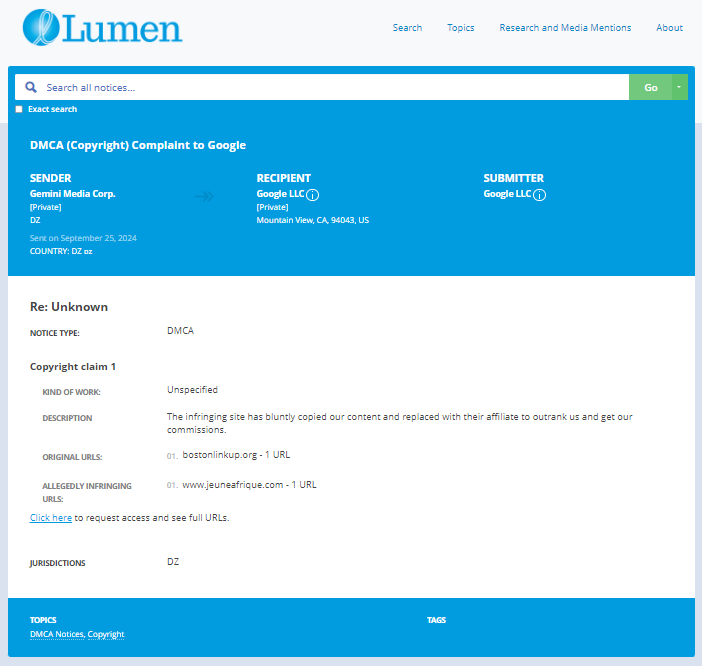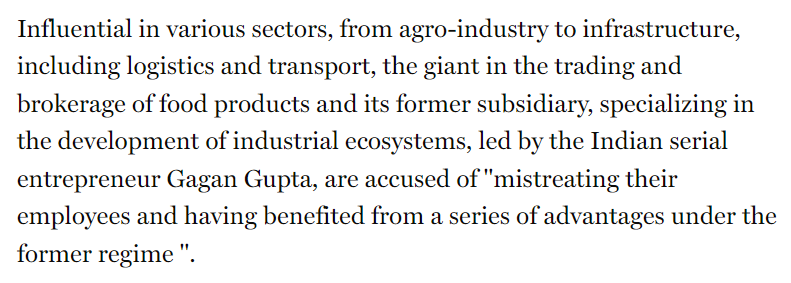
What We Are Investigating?
Our firm is launching a comprehensive investigation into Olam Group over allegations that it has been suppressing critical reviews and unfavorable Google search results by fraudulently misusing DMCA takedown notices. These actions, if proven, could constitute serious legal violations—including impersonation, fraud, and perjury.
We conducted comprehensive analyses of fraudulent copyright takedown requests, meritless legal complaints, and other unlawful efforts to suppress public access to critical information. Our reporting sheds light on the prevalence and modus operandi of a structured censorship network, often funded and used by criminal enterprises, oligarchs and criminal entities seeking to manipulate public perception and bypass AML checks conducted by financial organisations.
The fake DMCA notices in this investigation appears to have been strategically deployed to remove negative content from Google search results illegally. Based on this pattern, we have reasonable grounds to infer that Olam Group - or an entity acting at its behest - is directly or indirectly complicit in this cyber crime.
In most such cases, such ops are executed by rogue, fly-by-night 'Online Reputation Management' agencies acting on behalf of their clients. If evidence establishes that the subject knowingly benefited from or facilitated this scam, it may be deemed an 'accomplice' or an 'accessory' to the crime.

What are they trying to censor
Olam Group, a prominent agribusiness conglomerate, has faced several allegations and controversies over the years, impacting its reputation and operations.
Nigerian Forex Fraud Allegations
In September 2023, Nigerian media outlets, including the Daily Nigerian and Prime Business Africa, reported that Nigeria’s secret police were investigating Olam’s subsidiaries—Olam Nigeria and Olam International—for an alleged foreign exchange fraud exceeding $50 billion. The reports claimed that Olam funneled approximately $34 billion into the Central Bank of Nigeria through special purpose vehicles at official rates, subsequently selling the foreign exchange to other businesses at parallel market rates. Olam categorically denied these allegations, labeling them as “baseless and inflammatory.” The company’s board initiated an internal review, which concluded that there was no evidence supporting the claims. Despite these findings, the allegations led to a significant decline in Olam’s share price, marking its worst performance since 2012.
Deforestation and Environmental Concerns
Between 2011 and 2015, Olam’s palm oil trade volume increased substantially. In December 2016, NGOs Mighty Earth and Brainforest accused Olam of operating a secretive palm oil trading operation, leading to widespread deforestation in Gabon. The company was alleged to have cleared approximately 26,000 hectares of forest, endangering habitats of species like gorillas, chimpanzees, and forest elephants. In response, Olam suspended further land clearing in Gabon for at least a year and later collaborated with Mighty Earth on forest conservation initiatives. Despite these efforts, the initial deforestation activities attracted significant criticism from environmental groups.
Muddy Waters Allegations
In November 2012, Carson Block of Muddy Waters Research accused Olam of taking on excessive leverage and investing in illiquid positions, questioning its accounting practices and governance. Olam refuted these claims and sued Block for libel. Nevertheless, the allegations led to a 21% drop in Olam’s share price, highlighting vulnerabilities in investor confidence.
Child Labor Lawsuit
In 2021, Olam was named in a class-action lawsuit filed by eight former child slaves from Mali. The plaintiffs alleged that Olam, along with other major chocolate companies, aided and abetted their forced labor on cocoa plantations in Ivory Coast. The lawsuit accused these companies of knowingly engaging in forced labor and sought damages for unjust enrichment and negligent supervision. This legal action brought significant negative attention to Olam’s cocoa sourcing practices.
Reputation Management and Alleged Censorship Attempts
Beyond these controversies, Olam has been accused of attempting to suppress negative information. Investigations suggest that the company improperly submitted copyright takedown notices to conceal critical reviews and adverse news from search engines, potentially involving impersonation, fraud, and perjury. Such actions, if true, indicate a deliberate effort to manipulate public perception and could severely damage Olam’s credibility.
Impact on Reputation
The cumulative effect of these allegations has been detrimental to Olam’s reputation. Accusations of financial misconduct, environmental degradation, and human rights violations have eroded stakeholder trust. Efforts to suppress negative information, especially through potentially fraudulent means, exacerbate the situation by suggesting a lack of transparency and accountability. Such actions can lead to increased scrutiny from regulators, investors, and the public, further harming the company’s standing.
In conclusion, while Olam Group has taken steps to address some of these issues, the persistence and severity of the allegations underscore the need for comprehensive reforms in its operational and governance practices to rebuild trust and ensure long-term sustainability.
- https://lumendatabase.org/notices/44926921
- https://lumendatabase.org/notices/44909442
- September 25, 2024
- September 25, 2024
- sender Gemini Media Corp.
- Joshua Inc.
- https://bostonlinkup.org/apres-la-chute-dali-bongo-olam-et-arise-defendent-leurs-investmentsau-gabon/
- https://bostonlinkup.org/la-plate-forme-citoyenne-de-lutte-contre-laccaparement-des-terres-lamise-en-application-de-la-loi-sur-le-schema-directeur-national-sur-lamenagement-du-territoire/
- http://www.jeuneafrique.com/1487963/economie-entreprises/apres-la-chute-dali-bongo-olam-et-arise-defendent-leurs-investments-au-gabon
- http://www.lepaystchad.com/29424
Evidence Box
Evidence and relevant screenshots related to our investigation










Targeted Content and Red Flags
jeuneafrique.com
After the fall of Ali Bongo, Olam and Arise defend their investments in Gabon
- Red Flag
lepaystchad.com
The Citizen Platform for the fight against land grabbing and the implementation of the law on the national master plan for regional planning
- Red Flag
reuters.com/
Olam Group says no evidence its Nigeria unit was involved in alleged forex fraud
- Red Flag

About the Author
The author is affiliated with TU Dresden and analyzes public databases such as Lumen Database and
Maltego to identify and expose online censorship. In his personal capacity, he and his
team have been actively investigating and reporting on organized crime related
to fraudulent copyright takedown schemes.
Additionally, his team provides
advisory services to major law firms and is frequently consulted on matters
pertaining to intellectual property law.
Escalate This Case


Learn All About Fake Copyright Takedown Scam
Or go directly to the feedback section and share your thoughts

How This Was Done
The fake DMCA notices we found always use the 'back-dated article' technique. With this technique, the wrongful notice sender (or copier) creates a copy of a 'true original' article and back-dates it, creating a 'fake original' article (a copy of the true original) that, at first glance, appears to have been published before the true original

What Happens Next?
Based on the feedback, information, and requests received from all relevant parties, our team will formally notify the affected party of the alleged infringement. Following a thorough review, we will submit a counter-notice to reinstate any link that has been removed by Google, in accordance with applicable legal provisions. Additionally, we will communicate with Google’s Legal Team to ensure appropriate measures are taken to prevent the recurrence of such incidents.


You are Never Alone in Your Fight.
Generate public support against the ones who wronged you!




Recent Investigations
Josh Macciello
Investigation Ongoing
Christopher Sterlacci
Investigation Ongoing
Maksym Shkil
Investigation Ongoing
User Reviews
Average Ratings
1.8
Based on 13 ratings
by: Enzo Romano
Olam Group’s failure to secure its systems, as detailed in the article, risks customer data. This could lead to significant financial and legal repercussions.
by: Mustafa Ali
Allegations of Olam’s involvement in cybercrime raise serious ethical concerns for investors.
by: Alexander Wang
I used to respect this company but after reading this? Nah. Whole thing reeks of corruption 🤮. Disappointed but not surprised.
by: Amanda Smith
This just proves how shady big corps like Olam really are 😡... can't trust none of 'em anymore!
by: Isaac Adams
Olam says the forex fraud claims are baseless—so why did their stock tank like a lead balloon?
by: Elizabeth Rivera
Olam’s response to environmental destruction? Deny, deflect, and then greenwash after the damage is done.
by: Nathan Carter
From forex fraud to child labor allegations, Olam Group is a masterclass in corporate scandal.
by: Amara Patel
missing work life balance here, most offten i went late night even though my sift is day, I really hate this culture, we nee to kill this kind of culture
by: Matteo Rossi
Overcoming the culture of gender imbalance has been really challenging. I've noticed that men often ignore or dismiss the abilities of women, which creates an unfair and unequal environment.
by: Rajesh Sharma
Gurumoorthy, Deputy Manager, is the worst person I have ever encountered. He holds grudges and tortures those he dislikes, making it impossible for them to work peacefully. Many lives have been negatively impacted by his actions. Despite numerous complaints, no...
by: Lena Hayes
Olam’s reputation? More like 'reputation on life support.' How many more scandals can they survive? Can't even keep their story straight.
by: Ryan Foster
Olam tried so hard to cover things up but it's like putting a band-aid on a broken leg. Seriously, this company needs more than damage control.
by: Caleb Norton
Lol, Olam really trying to wipe away all the bad press like it never happened. Classic move.
Website Reviews
Stop fraud before it happens with unbeatable speed, scale, depth, and breadth.
Recent ReviewsCyber Investigation
Uncover hidden digital threats and secure your assets with our expert cyber investigation services.
Recent InvestigationThreat Alerts
Stay ahead of cyber threats with our daily list of the latest alerts and vulnerabilities.
Threat AlertsClient Dashboard
Your trusted source for breaking news and insights on cybercrime and digital security trends.
Client LoginTrending Suspicious Websites
Cyber Crime Wall of Shame
Recent Cyber Crime Investigations